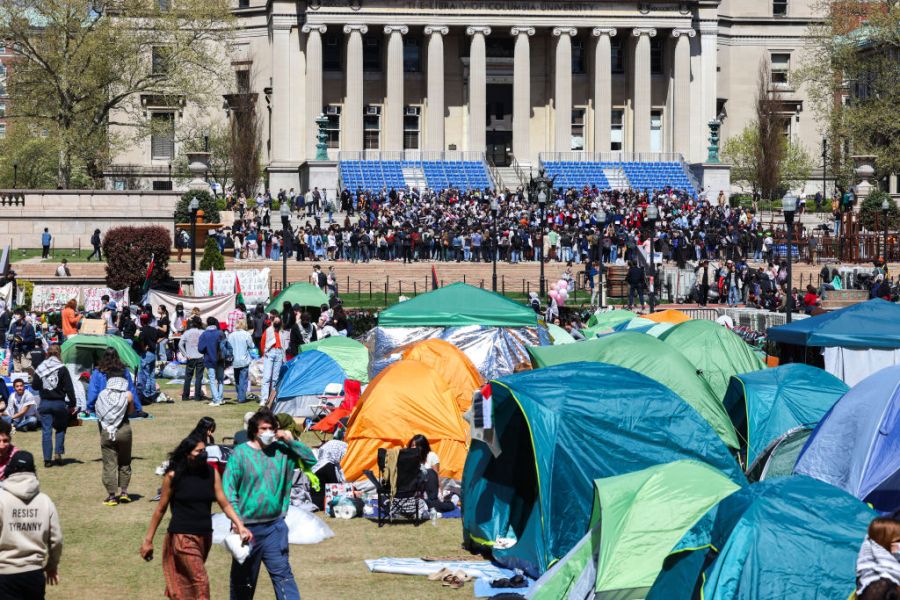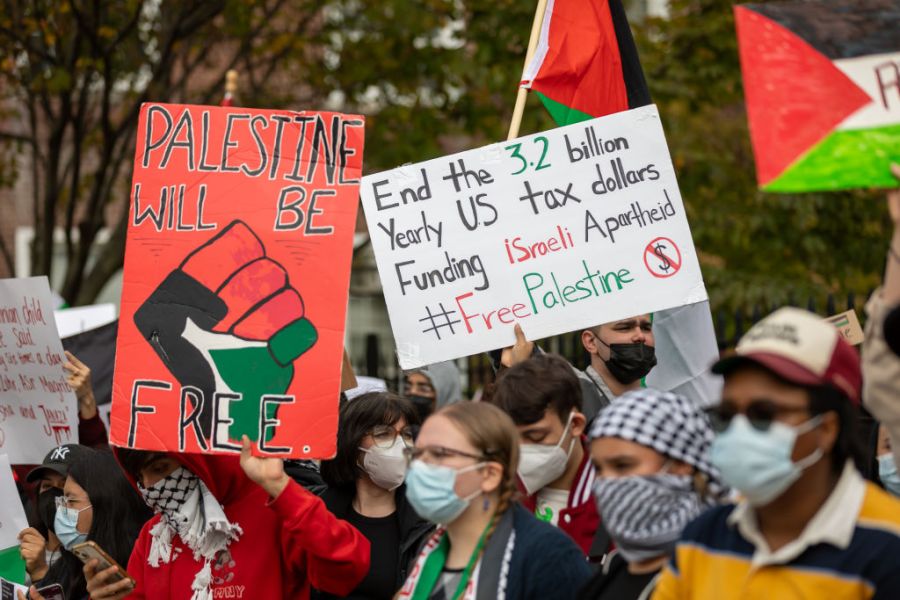(NewsNation) — Colleges across the country are pivoting plans for graduation ceremonies amid growing campus protests and tensions over the war in Gaza.
Campuses have become ground zero for a massive movement protesting Israel’s ongoing incursion of Gaza after the Oct. 7 Hamas attack.
Police have arrested dozens of people at pro-Palestinian demonstrations at Columbia University and NYU in New York City and Yale University in New Haven, Connecticut, over the last week.
Other campuses are also grappling with addressing demonstrations, which have grown louder in recent weeks.
Columbia President Minouche Shafik said in a letter to the school community Monday, “We cannot have one group dictate terms and attempt to disrupt important milestones like graduation to advance their point of view.”
Several schools have announced plans to cancel speakers and rearrange commencement logistics in order to curb anticipated disruption during graduation ceremonies.
Chaos at colleges
The University of Southern California changed its long-held tradition of inviting its valedictorian to speak at commencement due to this year’s honoree being involved in protests.
Valedictorian Asna Tabassum, a first-generation South Asian American Muslim, was scheduled to speak at this year’s commencement but was pulled by the university after pro-Israel groups accused her of being antisemitic.
“There is no free-speech entitlement to speak at a commencement. The issue here is how best to maintain campus security and safety, period,” USC Provost Andrew Guzman said in a statement.
Tabassum said she was “shocked by this decision and profoundly disappointed.”
The decision sparked outrage and several days of protests on campus.
After her ouster, the university dropped all of its other commencement speakers, including scheduled keynote speaker John M. Chu, a film director.
This year’s commencement will be the first time the school has not had a keynote speaker since 1942, according to the Associated Press.
Last month, pro-Palestine activists on the University of Michigan’s campus interrupted President Santa Ono’s speech at an honors convocation. Protesters called for the university to divest endowment funds from Israel, reported The Detroit News.
The University later put out an alert on rules regarding its graduation ceremonies, which are scheduled for May 4. The school stated that it would have designated areas for protesters, but banners and flags are not allowed.

“Our goal is to limit substantial disruption, ensure safety, and support a successful and celebratory event worthy of the achievements of our extraordinary graduates,” the school stated.
But the move by colleges to change graduation plans is drawing ire from students and civil rights groups who say colleges are siphoning their free speech and buckling to pro-Israeli voices.
Hussam Ayloush, executive director of the Greater Los Angeles Area office of the Council on American-Islamic Relations, joined NewsNation Now earlier this month calling USC “dishonest” for its decision to pull its valedictorian and “cowardly to be hiding behind the pretext or the excuse of security.”
“We can’t forever continue to defend the apartheid system and structure,” he said. “If we’re going to ban every speaker who calls for the dismantling of the apartheid system — which has been described as apartheid by every human rights organization in the world, including Israeli ones — then we won’t have any speakers anymore.”
Earlier this month, the Anti-Defamation League sent an open letter to college and university presidents urging them to “take clear decisive action” to ensure graduation ceremonies run smoothly and safely.
“We remain deeply concerned regarding the possibility of substantial disruptions during commencement ceremonies,” Shira Goodman, the ADL’s senior director of advocacy, said in a statement.
The US has a long history of campus protest
The level of protest that is occurring on campuses now is not unprecedented, Jonathan Zimmerman, a professor of education history at the University of Pennsylvania, told NewsNation.
Universities have long been the epicenter of student demonstrations, particularly over wars and social policies, he said. As a result, graduation ceremonies have also been disrupted, he added.
“In the 1960s, the volume, the density and also the violence and threat of violence was much, much greater,” Zimmerman said.
At the time, students were protesting against the Vietnam War, social injustices, civil rights and freedom of speech on college campuses.
In 1970, members of the Ohio National Guard fired into a crowd of Kent State University demonstrators, killing four and wounding nine students.
Twelve days later, city and state police confronted a group of students outside a campus dormitory at Jackson State College in Mississippi, killing two students and injuring twelve.
Jackson State’s 1970 commencement was canceled because of the bloodshed, and graduates that year received their diplomas in the mail, if at all, reported NBC News.
By 1970, 8,000 bombings or attempted bombings were reported by colleges, and around 7,000 had been arrested for protesting, most of them were students. More than 30 states enacted laws to address campus disturbances.

In April 1968, Columbia students shut down the university for one week in protest of the school’s ties to the Vietnam War and its plans to build a property near Harlem Park, among other concerns.
In many ways, the demands were not too far from what present-day student demonstrators are demanding from Columbia’s administration, Zimmerman said.
Past student protests did create a huge amount of change, Zimmerman said, not only with internal college policies but also with how these schools were connected to wars.
“Because there was this new microscope that was put on the connections between universities and military research, some schools, not all, did scale back their military research,” he said.
And in the 1980s, a lot of universities divested from anything involving South Africa largely because of student protests of its apartheid regime, Zimmerman added.
All eyes are on Columbia University
The large-scale pro-Palestine protest at Columbia University continued into its sixth day Tuesday despite New York police arresting over 100 demonstrators last week.
Students put up tents and stayed on campus to protest Israel’s military action in Gaza and demanded the school divest from companies they say “profit from Israeli apartheid.” Several faculty members joined the protest.
On Columbia’s campus, which has gotten national attention, students are willing to risk suspensions and arrests.
“We represent our community. We don’t represent the external community who may be mobilizing outside of the gates for us. We align with full and total divestment,” Columbia first-year Dalia told NewsNation.
Some Jewish students on campus expressed concerns about the prolonged protest.
“I mean, sometimes my heart beats a little faster, especially when one of the pro-Palestinian protesters literally followed me even while I was just sitting on the steps on campus,” Columbia student Jessica Schwalb told NewsNation.
Most classes will be held in a hybrid setting for the remainder of the semester, and the school has tightened campus security.
“Safety is our highest priority as we strive to support our students’ learning and all the required academic operations,” the university’s provost, Angela V. Olinto, and chief operating officer, Cas Holloway, told NewsNation affiliate PIX11 in a statement Monday.
There have not been any credible threats made to particular groups or individuals coming from the encampment protests, the New York Police Department said.
